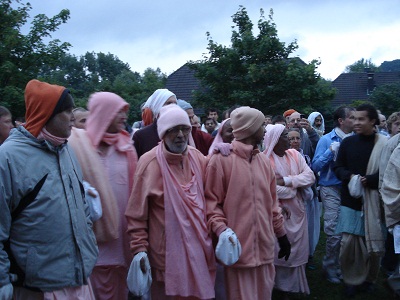Sri Srimad Bhaktivedanta Narayana Gosvami Maharaja
Morning walk
Frielendorf, Germany: July 11, 2007
Sripad Madhava Maharaja: You are initiated?
Devotee: Yes, I am initiated.
Sripad Madhava Maharaja: Then why are you smoking?
Devotee: I am trying to give it up.
Srila Gurudeva: Give it up.
Devotee: I will do it.
[Then, performing a short marriage ceremony, Srila Gurudeva tells the bride and groom to exchange garlands. Then...]
Srila Gurudeva: You must first promise that after your marriage ceremony you shall remain together for the rest of your lives; that you will not divorce each other.
Srila Gurudeva: (To the groom) Repeat after me. I promise that throughout my life...
Devotee: I promise that throughout my life...
Srila Gurudeva: I will not divorce her.
Devotee: I will not divorce her; I promise.
Srila Gurudeva: You must respect each other. (To the groom) You should respect her.
On a few occasions Mother Yasoda chastises Krsna in this way: "You are a thief. You are a friend of the monkeys." But the gopis very often rebuke Him in stronger ways: "You have killed a lady (Putana), and You have killed a cow (Aristasura). Don't touch us. Go away at once. Jahi, jahi – Go, go."
What kind of bhakti is this? Is it bhakti to rebuke and call Krsna 'cheater' and 'head of all liars'? Is this bhakti? How is it bhakti?
Sisupala also rebuked Krsna, saying, "There is no certainty as to the identity of Your father and mother. You are a liar and a cheater." Sisupala uttered words similar to that of the gopis, but he received a different result. Krsna cut off his head. Why was this?
Sripad Padmanabha Maharaja: The gopis have unparalleled prema for Krsna, and their whole intention is that Krsna should be happy. They understand that Krsna is very pleased by the loving mood coming from their hearts.
Srila Gurudeva: The gopis consider that Krsna will be happy by their abusing and insulting Him.
Can you explain?
Prema Prayojana dasa: In his definition of uttama-bhakti, Srila Rupa Gosvamipada uttered the words anukulyena krsnanu silanam. The word anukulyena means 'devoid of an antagonistic mood towards Krsna.' Sisupala was antagonistic towards Him, whereas the gopis love Him. In fact, the gopis become angry only because of their very intimate relationship with Him. Krsna personally confirmed this when He said, "When My beloveds rebuke me, I experience such great pleasure that I forget all the glorification of the Vedas, and the stutis (hymns) of Brahma and other demigods.
Sripad Madhava Maharaja: In the Adi Purana, Arjuna asked Krsna, "O Krsna, I have heard that You become so happy when the Vraja gopis rebuke You in many ways. On the other hand, when Brahma stole Your cows and then glorified You by ardent prayers, You hardly paid any attention to him. What is the cause of this?" Krsna replied, "Arjuna, because you are My dear friend, I will now tell you something very confidential. In the hearts of the gopis of Vraja resides a beautiful paramour mood. Thus, even their harsh words please Me immensely. Although great poets glorify Me with ornamental language, they cannot please Me; whereas the gopis overwhelm Me with pleasure.
Srila Gurudeva: They both explained this very well. Krsna is not very interested to hear His glories sung from the mouths of Brahma, and He never looks towards him. For the gopis, on the other hand, He holds His two ears like cups in order to hear their words.
Do you have any questions?
Sripad Nemi Maharaja: Your speaking is so inspired here; even more so than in Badger. It seems that you are speaking with more energy, more enthusiasm. Is it because of the number of devotees here?
Srila Gurudeva: It seems that I am telling more? I spoke strongly about the true symptoms of raganuga-bhakti for those who have some misconception. It was for them that I spoke such words.
Transcendental greed is very sacred and exalted. It must therefore be kept concealed within the heart, as burning camphor is kept in a closed room so that its fragrance will not evaporate but instead become more and more condensed. If you have any realizations, it is best to conceal them. Do you understand the word yara-mata? [Yara-mata means 'one whose mother has a paramour lover.']
Devotee: No.
Srila Gurudeva: It applies to one who knows, "My mother goes to other men," but he does not tell others.
Paramananda dasa: Srila Gurudeva, I heard that if we don't share our realization, we will lose it.
Srila Gurudeva: Some things are meant to be concealed in the heart and others are meant to be shared. Some subject matters may be told to worldly persons, whereas mysterious things are for telling only to very elevated persons. It is not that one rule applies to all circumstances. It is not that one may tell anything everywhere.
All of you, be ready to speak in this evening's class about Bakasura, Aghasura, and Brahma-vimohana-lila.
Sripad Padmanabha Maharaja: Srila Gurudeva, what you have just mentioned about the gopis' mood toward Krsna is very difficult to understand: On one hand the gopis have so much love for Krsna, and on the other side they become angry with Him and rebuke Him.
Srila Gurudeva: It seems that they are angry, but actually they are not. They act in that way simply to please Krsna. They do this so that others will think they are angry.
Sripad Damodara Maharaja: Gurudeva, Srila Trivikrama Maharaja said that Krsna never abuses the gopis.
Srila Gurudeva: Yes, never. He considers that He cannot dare to abuse them, otherwise they will all leave His company at once.
Sripad Srauti Maharaja: In a commentary you gave on kanta-prema (the love of the gopis for Krsna) in the Raya Ramananda Samvad, you said that due to the gopis' surrender to Krsna they know that by insulting Him He will always remain with them.
Srila Gurudeva: The one thing I neglected to say is that Krsna is very surrendered to the gopis.
Sripad Srauti Maharaja: Yes. Is it because they surrendered that He also surrendered fully to them?
Srila Gurudeva: Krsna has surrendered, but not fully. He can't.
Sripad Asrama Maharaja: Suppose somebody is not realized, and yet he is speaking about high topics (regarding the amorous pastimes of Sri Sri Radha and Krsna). In order to explain bhava and prema, he is reading and speaking these pastimes to others. He is not going so deeply into the details, not making the pastimes look naked, but he is doing something near to that. Is this okay, or not okay?
Srila Gurudeva: To whom is that person speaking? If it is to young ladies, then it is bogus. Men should not speak to ladies alone.
Sripad Asrama Maharaja: What if it is spoken to a mixed audience?
Srila Gurudeva: If males are also there, and if one is glorifying Sri Sri Radha and Krsna's pastimes in a covered way, that may be okay; there is no harm in that. A teacher may speak only with persons who have the qualifications to hear such topics.
Sripad Asrama Maharaja: In certain circumstances there are some qualified hearers. In other words, sometimes our groups are mixed. What should a teacher do in such cases?
Srila Gurudeva: A teacher or guru must be careful not to speak to an unqualified audience, otherwise both the guru and hearer will go down.
naitat samcarej jatu manasapi hy anisvarah
vinasyaty acaran maudhyad yatharudro 'bdhi-jam visam
Srimad-Bhagavatam, 10.33.30
One should never imitate the behavior of great persons. If out of foolishness an ordinary person imitates such behavior (i.e. Krsna's dancing with the gopis), even mentally, he is doomed; just as one who imitates Rudra by swallowing an ocean of poison.
(To Sripad Padmanabha Maharaja) What is the meaning?
Sripad Padmanabha Maharaja: This is the verse told by Srila Sukadeva Gosvami to Maharaja Pariksit at the end of his rasa-lila narration. He says there that no one should dare to imitate – even mentally, or even to imagine – that they can perform rasa-lila as Krsna does. This is because they are not Isvara, God, or god-like controllers like Lord Siva. Lord Siva can drink an entire ocean of poison and not become affected by it, but the ordinary conditioned soul will immediately die if he tries to imitate him.
Srila Gurudeva: If one has some realization due to hearing from Gurudeva with faith, he can tell something to those who are qualified to hear. Otherwise, he should not repeat anything.
Sripad Asrama Maharaja: If someone was once a sannyasi, but after he left sannyasa, he is still touching on high things – is that okay, or not okay?
Srila Gurudeva: We cannot put a lock on anyone's mouth.
Devotee: Srila Gurudeva, what does the name Radharani mean?
Srila Gurudeva: You have no qualification to hear that confidential subject matter. Chant, and pray to Krsna to remove your anarthas. That will be good for you. It is written In Srimad-Bhagavatam:
vikriditam vraja-vadhubhir idam ca visnoh
sraddhanvito 'nusrnuyad atha varnayed yah
bhaktim param bhagavati pratilabhya kamam
hrd-rogam asv apahinoty acirena dhirah
Srimad-Bhagavatam, 10.33.39
A sober person who in the beginning faithfully and continuously hears from his guru the narrations of Lord Krsna's unprecedented rasa dance with the young gopis of Vraja, and later describes those pastimes, very soon attains para-bhakti, or prema-bhakti, for the Supreme Lord, and thus becomes competent to quickly dispel the heart-disease of lust.
If one hears with full faith from a realized person, and after that he describes those topics with faith, then, very soon, transcendental kama (amorous desires) for Krsna will manifest in his heart. What kind of kama? He will determine, "I must serve Krsna as the gopis (manjaris) serve. This mood, called kamanuga-bhakti (the gopis' transcendental paramour love for Krsna) will manifest in the heart. At that time all worldly lust, the disease of the heart, will disappear forever. If one hears, or has heard, the topics of Krsna's pastimes with the gopis, and if lust from one's heart is thus gone, how is it possible for that person to marry again ? Do you understand? If that person marries again, what does this mean?
Has Saunaka Rsi or any of the eighty-eight thousand rsis married again?
Sripad Asrama Maharaja: No.
Srila Gurudeva: The fruit of such faithful hearing is bhakti. The measurement of one's advancement in bhakti is the extent to which one is detached from wealth, reputation, wife, and all other varieties of sense gratification.
Sripad Asrama Maharaja: Will his sraddha (faith) be on the level of nistha (steadiness), or ruci (taste for devotion), or just sraddha?
Srila Gurudeva: Full sraddha.
Gokula-candra dasa: Srila Gurudeva, how does the maha-mantra relate to sri guru? If one considers that his worshipful Deity is Lord Rama in Ayodhya, then he might think that Hare Rama means Sita and Rama. So how does it refer to...?
Srila Gurudeva: We should understand that the worshipful Deity of the Hare Krsna mantra is one. In Hare Krsna, the name Krsna is there, and Krsna is non-different from His name. In that case, Hare Rama cannot be Sita and Rama. A person must know who his worshipful Deity is. Rama refers to Radha-Ramana, meaning Krsna, the beloved of Radha, who enjoys pastimes with Her.
Gokula-candra dasa: And how does the maha-mantra refer to sri guru?
Srila Gurudeva: You can consider that gurudeva has given you the maha-mantra – Radha and Krsna. We are therefore always indebted to Him. This indebtedness is not a worldly exchange; it is transcendental.
Aristasana dasa: Gurudeva, regarding that verse you just quoted: "Vikriditam vraja-vadhubhir idam ca visnoh." You said that we should hear and repeat it. My question is, how can we repeat such a high subject?
Srila Gurudeva: Not everyone is qualified to repeat these topics. When one's hearing is complete, and by that perfect hearing one achieves all spiritual qualities and all negative qualities disappear from his heart, then he is qualified to speak.
Sripad Padmanabha Maharaja: Gurudeva, I have a question in this regard. Suppose a devotee is hearing with strong faith, serving for some time, and repeating what he has heard. But then, possibly because he has committed some offense, he falls from his position. Is it possible that at one time he could have had this kind of sraddha and then lost it?
Srila Gurudeva: Yes, it may be. Until the stage of bhava-bhakti a person may do something wrong. He may criticize guru, the Vaisnavas, or Krsna, and then he may fall down.
Vicitri dasi: Last night you spoke this sloka:
nivrtta-tarsair upagiyamanad
bhavausadhac chrotra-mano-'bhiramat
ka uttamasloka-gunanuvadat
puman virajyeta vina pasughnat
Srimad-Bhagavatam, 10.1.4
Sukadeva Gosvami said to Maharaja Pariksit: Glorification of Uttamasloka Sri Krsna is performed in the parampara system; that is, it is conveyed from spiritual master to disciple. Such glorification is relished by those no longer interested in the false, temporary glorification of this material manifestation. Descriptions of the Lord are the right medicine for the conditioned soul undergoing repeated birth and death. Therefore, who will cease hearing such glorification of the Lord, except a butcher or one who is killing his own self?
You were saying that hearing hari-katha from the lips of a pure Vaisnava is the infallible medicine to remove our anarthas and give us bhakti. Then you told the story of Ananta Vasudeva (a disciple of Srila Prabhupada Bhaktisiddhanta Sarasvati Thakura). You explained that he had been hearing hari-katha from the lips of a pure Vaisnava – he was following the formula – but that he fell down. So, what went wrong? Why didn't it work?
Srila Gurudeva: I explained that he began to criticize Srila Prabhupada.
Sripad Madhava Maharaja: His own guru.
Srila Gurudeva: He claimed that Srila Prabhupada does not understand madhura-rasa (the mellows of Sri Sri Radha-Krsna amorous love). He left Srila Prabhupada and went to a sahajiya babaji. He gave away Srila Prabhupada's books to vendors It was because of this very great offense that a desire to marry came in his heart. He thus took poison and descended to Rasatala (one of the hells). So, you must all be careful.
Paramananda dasa: Srila Gurudeva, Maharaja Pariksit said to the bull of Religion, Dharma, that the person who identifies the performer of a sinful act gets the same destination as the person who perpetrated the act. What does this mean?
The King said: O you who are in the form of a bull, you know the truth of religion. You are speaking according to the principle that the destination intended for the perpetrator of irreligious acts is also intended for one who identifies the perpetrator. You are no other than the personality of religion. (Srimad-Bhagavatam 1.17.22)
Srila Gurudeva: It means that another person is not responsible for one's sufferings. Although it was Kali who beat the legs of the bull, the bull did not tell Maharaja Pariksit, "Kali had done this to me." As an elevated devotee, he said, "I don't know who has done this to me. It has been caused by my previous karma. He who controls the entire world – who ordains creation, maintenance and destruction – has done this."
O greatest among human beings, it is very difficult to ascertain the particular miscreant who has caused our sufferings, because we are bewildered by all the different opinions of theoretical philosophers. Some of the philosophers, who deny all sorts of duality, declare that one's own self is responsible for his personal happiness and distress. Others say that superhuman powers are responsible, while yet others say that activity is responsible, and the gross materialists maintain that nature is the ultimate cause. There are also some thinkers who believe that no one can ascertain the cause of distress by argumentation, nor know it by imagination, nor express it by words. O sage amongst kings, judge for yourself by thinking over all this with your own intelligence. ((Srimad-Bhagavatam 1. 17.18-20)
Paramananda dasa: Would the saintly King Pariksit feel some discomfort by punishing criminals? Is He unhappy to give this punishment?
Srila Gurudeva: Kali-yuga (The age of quarrel and hypocrisy) is a very high-class yuga (age). In Kali-yuga, if pious or spiritual activities are performed by one's mind alone, the fruits of those activities will be enjoyed by the performer. On the other hand, if one performs some sin – not by body, but by mind – that mental act will not give a sinful reaction.









